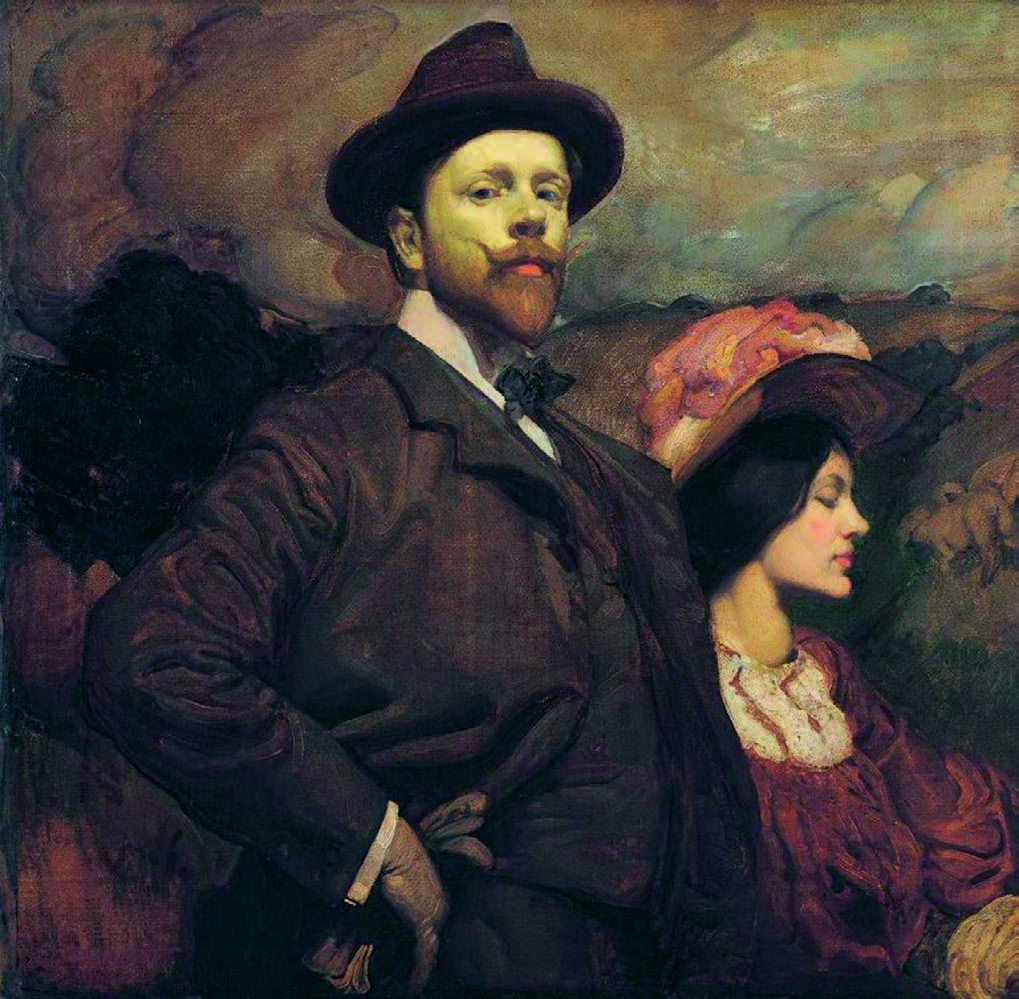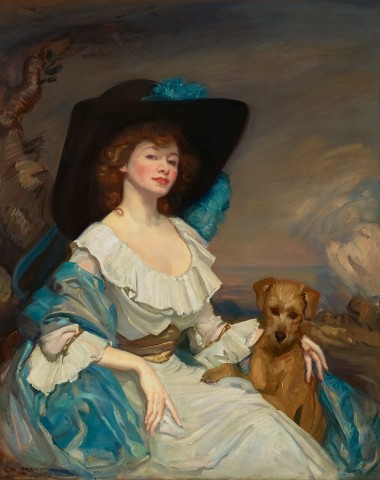DOÑA SOL, 1910
GEORGE LAMBERT
oil on canvas
127.5 x 102.0 cm
signed and dated lower left: G. W. LAMBERT / 1910
The Fine Art Society, London
Private collection
Christie’s, Melbourne, 14 March 1974, lot 435 (as ‘Portrait of a Woman with a Terrier’)
Clune Galleries, Sydney (label attached verso)
Jack Manton, Queensland
Thence by descent
Jennifer Manton, Sydney
Estate of the above, Sydney
Third Exhibition of Fair Women, ISSPG, Grafton Galleries, London, 26 May – 31 July 1910, cat. 69
Birmingham Post, 30 May 1910
Henry, P., Art News, London, 2 June 1910
Onlooker, London, 4 June 1910
P.G. Konody, Observer, London, 5 June 1910, p. 9 (as ‘Doña Sol’)
Ingram, T., A Matter of Taste, Collins, Sydney, 1976, pp. 46, 134 (illus., as ‘Portrait of a Woman with a Terrier’)
Gray, A., George Lambert 1873 – 1930, Catalogue Raisonné, Bonamy Press in association with Sotheby’s and Australian War Memorial, Canberra, 1993, cat. P116, p.36
In London’s Edwardian age, sophisticated beauties of fashionable inclination happily indulged themselves in hats of outrageous size. Society portrait painters responded with alacrity; two exceptional three-quarter length works of this time by George Washington Lambert were Mrs Henry Dutton of South Australia (Guy Morrison Collection, London) and our painting, Doña Sol. Both were painted in 1910. Aristocratic and gracious, Emily Dutton’s low-cut black dress enhanced her beauty. The dress of the more theatrically inclined Doña Sol was likewise low cut, accompanied by blue shawl and blue ostrich feathers peeking cheekily around the edge of a black hat. Lambert silhouetted his ladies beguilingly against romantic landscapes. The ‘trepidation’ of Henry Dutton, Emily’s husband, who commissioned the portrait during a visit to London, was such that he made watchful attendance at the studio sittings.1
In this quintessential age of feminism, Lambert endowed these belle époque pictorial moments with poise, elegance and eye-catching gestures. For Mrs Dutton the look is direct; for Doña Sol it is haughty. The latter has sensuality in abundance, heightened by bravura. Detachment and a sense of the unobtainable adds a new edge. Andrew Motion, writing on Lambert’s portrait, Miss Thea Proctor, 1903 (Art Gallery of New South Wales, Sydney), observed that: ‘Its potency depends greatly on its restraint’, adding, the handling of the paint ‘is intensely sensuous’,2 a characteristic shared with Doña Sol and others. Naked flesh, liberally revealed, and underlying eroticism are celebrated in elongated neck and arms. Doña Sol is identified by Anne Gray as ‘An exhibition piece, not a commissioned portrait’3 – the dog giving a clue to the otherwise enigmatic nature of the painting.
DH2021 ART Cat (November) - Catalogue FA Flip book version.jpg

Animals appear in portraits of all kinds and for all kind of reasons. The horse ennobles the conquering emperor in Jacques-Louis David’s equestrian portrait of Napoleon (Musée du Louvre). The pugnacious nature of William Hogarth is emphasised by the presence of his pug dog in the very British self-portrait (Tate Gallery, London). And in Rupert Bunny’s pair, Portrait of the Artist’s Wife, c.1896 (National Gallery of Victoria, Melbourne) and Jeanne with Her Terrier, c.1896 (private collection), fidelity is enshrined in embrace. The difference between Bunny’s two paintings and Doña Sol could not be more stark. In Lambert’s painting, the relationship between woman and dog is detached and teasingly distant. Using the entire person for expression of character, as was his manner, Lambert’s Doña Sol typically draws attention to her hands – elegantly idle. Here is the quizzical coquette, acting her flirtatious part by provocatively drawing attention to herself.
When Doña Sol was exhibited in London in mid-1910, critical opinion was divided. The Birmingham Post praised its ‘admirable colour arrangement’4, while Paul Henry in Art News thought it ‘too intentionally clever’5 and P.G. Konody of The Observer stung with ‘superficial slickness’, failing to acknowledge that Lambert’s slick usages were part of his characterisation of fickleness.6 For Lambert, it was a period of great achievement through many works of outstanding merit. The exquisitely beautiful Portrait of Annie, Wife of John Proctor Esqr, Barrister at Law, 1907 was hailed by the same P.G. Konody of The Observer: ‘It is in this portrait of Mrs Proctor that Mr Lambert proves his right to be counted among the leading portrait painters’.7 When The Blue Hat, 1909 (Kerry Stokes Collection, Perth) was exhibited in the Paris New Salon, it was judged ‘The Picture of the Year’.8 The unconventional Chesham Street, 1910 (National Gallery of Australia, Canberra), provided a bold psychological approach to medical examination. And as if to crown these years of achievement, in 1910 Lambert was commissioned by London’s Imperial Colonial Club to paint a grand equestrian portrait of King Edward VII.
1. Their son Geoffrey Dutton, quoted in a letter: see Gray, A., George Lambert 1873-1930, Catalogue Raisonné, Bonamy Press in association with Sotheby’s and Australian War Memorial, Canberra, Canberra, 1993, p. 36
2. Motion, A., The Lamberts: George, Constant & Kit, Chatto & Windus, London, 1986, p. 45
3. Gray, op. cit, p. 36
4. Birmingham Post, 30 May 1910
5. Henry, P., Art News, 2 June 1910
6. Konody, P.G., Observer, 5 June 1910
7. Ibid, 9 February 1908, p. 5
8. Motion, op. cit., p. 46
DAVID THOMAS
